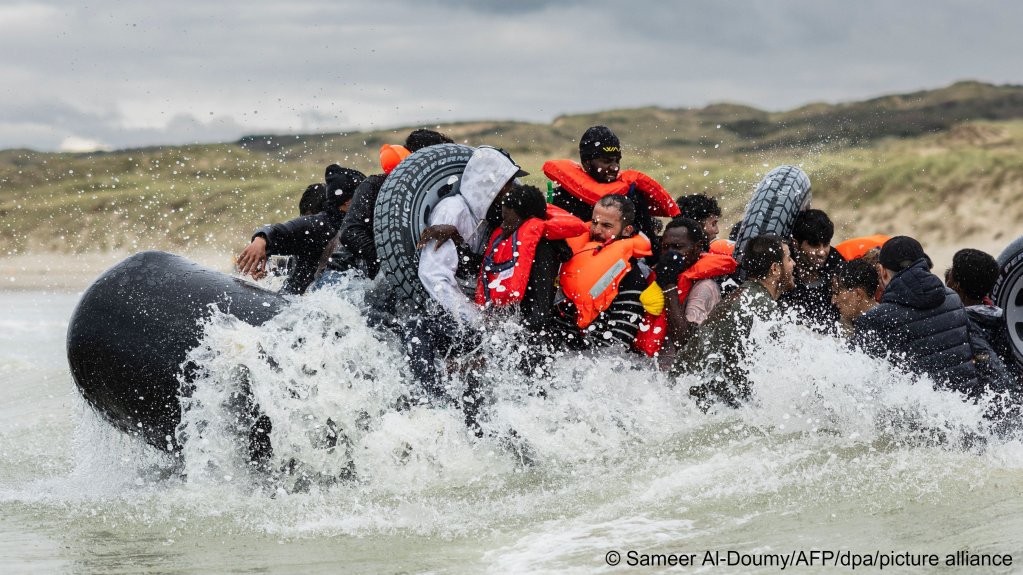The UK has agreed several deals with Iraq to return migrants and combat people smuggling. It is seen as a big step towards fulfilling the British prime minister’s pledge to "smash the gangs" operating abroad.
The deals were announced after a three-day visit to Iraq and the northern region of Kurdistan by the British interior minister (Home Secretary), Yvette Cooper, and Border Security Commander Martin Hewitt.
Cooper said the pacts sent "a clear signal to the criminal smugglers that we are determined to work across the globe to go after them."
Criminal networks operating in Iraq and Europe have been responsible for smuggling thousands of people, including across the Channel to the UK, said a statement from the Home Office.
"There are smuggler gangs profiting from dangerous small boat crossings whose operations stretch back through Northern France, Germany, across Europe, to the Kurdistan region of Iraq and beyond," Cooper is quoted in the statement as saying.
UK authorities, including the National Crime Agency (NCA), have already been working with law enforcement in Iraq. Last week the NCA announced the conviction of two Kurdish men who had been part of a group smuggling migrants from Iraq, Iran and Syria through Turkey, Belarus, Moldova and Bosnia to western European countries, including the UK. The men had been operating a car wash franchise in Wales.
Read AlsoKey suspect arrested in UK in Europe-wide people-smuggling crackdown
Deals worth nearly 1 million euros
Key aspects of cooperation agreed this week include UK funding of up to around 300,000 pounds (360,000 euros) to train Iraqi authorities in border security. The same amount will be allocated to "capacity building" to disrupt organized gangs smuggling people and drugs.
The UK has also pledged 200,000 pounds for irregular migration and border security projects in the Kurdistan region. There will be enhanced cooperation between the two countries on organized immigration crime, narcotics, human trafficking and illicit finance such as funding of terrorism
Campaigns are also to be launched in Iraq and Kurdistan to "counter misinformation and myths that people-smugglers post online." The aim is to reach potential migrant "customers" via the same social media platforms that smugglers often use to advertise their services.
Amanj Hasan Zada, a high-profile Iranian smuggler who was convicted in Britain earlier this month, posted videos of people he had successfully smuggled thanking him for his help. In one video the NCA said people were singing about him calling him "the best smuggler" as he threw cash at them and fired a gun into the air.
British borders chief Hewitt hopes to stop smugglers like Zada through better international cooperation. "This work is only going to improve, which means smuggling networks should be on notice that we are coming after you," he said.
Read AlsoVideo: How social media aids human trafficking and smuggling
Returns agreement
The governments of the UK and Iraq also signed a "joint statement on migration," mainly concerning the return of people who have no right to be in Britain, such as rejected asylum seekers. Returns from the UK are currently very slow, the Home Office statement notes.
In the year to June, around 3,000 undocumented Iraqis reached the UK and they make up the seventh-largest nationality crossing the Channel by boat. From July 2023 to June 2024, 26 Iraqis were deported, and 193 returned to Iraq voluntarily, according to government figures.
The asylum grant rate in the year to March 2024, which likely relates to people who arrived in 2023 or earlier, was 38 percent.
Since Labour took power in July, there has been an overall rise in deportations of 30 percent to 2,061, compared with the same period under the previous Conservative government.
Read AlsoChannel: Three more bodies found on French beaches

Commitment to uphold rights standards
With the new government pledging to speed up deportations further, the signing of bilateral return agreements has led to concerns about safeguarding human rights in countries to which migrants are repatriated.
Cooper told reporters that a commitment to international human rights standards was a central part of the statements agreed with Iraq on Thursday.
"Obviously … any individual asylum cases are being decided in terms of a case-by-case basis, but we’re also clear that as a result of a lot of the security work that has been done, Iraq today is not the same as it was 20 years ago, and so those returns need to be done on a case-by-case basis.
"But it is also clear that the rules need to be respected and enforced. And that includes for people who have not fled persecution, and it’s important that we make sure that happens," the UK news website inews quoted Cooper as saying.
Read AlsoEU ministers call for faster migrant deportations
No magic bullet
The chief executive of the Refugee Council, Enver Solomon, said the government must uphold international law – also for people who have not fled persecution – when making migration agreements with countries such as Iraq.
Solomon added that tackling smuggling gangs and cooperating with other countries on prosecutions should not be seen as a "magic bullet" that will stop refugees taking dangerous journeys to the UK.
"A comprehensive multi-pronged approach is needed that includes expanding safe and legal ways to reach the UK for those seeking asylum, a functioning asylum decision-making system to help refugees rebuild their lives and a new independent voluntary returns scheme that assists those whose asylum claims are refused to return with dignity and support."
